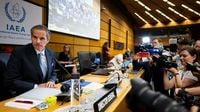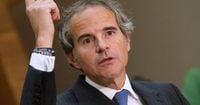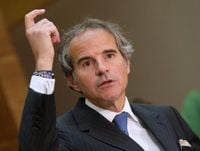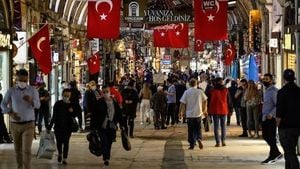On August 27, 2025, the International Atomic Energy Agency (IAEA) found itself at the center of a growing storm over Iran’s nuclear ambitions and the international community’s efforts to keep them in check. The agency’s Director General, Rafael Grossi, is now under the protection of Austria’s elite Cobra police unit following an unspecified threat that, according to Grossi, originated "from the direction" of Iran. The Wall Street Journal first broke the news of this heightened security, underscoring the seriousness of the tensions swirling around Iran’s nuclear program and the global stakes involved.
Grossi’s new security detail is no ordinary arrangement. The Cobra unit, renowned for its counter-terrorism expertise and for guarding Austria’s highest officials as well as U.S. and Israeli ambassadors, is now tasked with shielding the IAEA chief. As the Vienna-based nuclear watchdog’s profile has risen—thanks in part to Grossi’s high-profile missions into war zones like Ukraine and his agency’s persistent scrutiny of Iran—the risks have escalated accordingly. "It’s very regrettable that some people threaten the lives of international civil servants, the head of an international organization," Grossi told the Associated Press, adding, "we will continue our work."
This enhanced protection comes at a time when diplomatic efforts to resolve the standoff over Iran’s nuclear activities are faltering. After a series of last-ditch meetings between Iranian officials and their counterparts from France, Germany, and the United Kingdom (collectively known as the E3), no breakthrough has been reached. The E3, along with the United States, have set August 31 as the deadline for Iran to comply with key demands or face the reimposition of United Nations sanctions via the "snapback mechanism" of the 2015 Iran nuclear deal. These demands include resuming negotiations, allowing full access for UN inspectors to nuclear sites, and accounting for more than 400 kilograms of highly enriched uranium.
The urgency is palpable. As Grossi explained to the AP, "I can say that it is important that the inspectors are back. At the same time, we still need to clarify a number of things, and we still need to address all the issues that are important in terms of the inspections that we have to carry out in Iran." Despite some progress—inspectors have returned to Iran’s Bushehr nuclear power plant for the first time since the 12-day Iran-Israel conflict in June—Grossi stressed that access remains limited. Other sites, including those targeted by U.S. and Israeli strikes, are still off-limits.
The backdrop to this current standoff is fraught with mistrust and mutual recrimination. In June, Israel launched attacks on Iranian nuclear facilities after the IAEA Board of Governors voted to censure Iran for its lack of cooperation—the first such censure in two decades. Iran, for its part, accused the IAEA (without providing evidence) of aiding Israel and the United States in targeting its nuclear infrastructure. These allegations were echoed by top Iranian officials and state media, who went so far as to call for Grossi’s arrest and trial should he set foot in Iran again.
Iranian Foreign Minister Abbas Araghchi confirmed on August 27 that IAEA inspectors were present at the Bushehr plant to monitor a fuel replacement, a fact reported by the state-run IRNA news agency. However, Araghchi cautioned that this did not represent a broader breakthrough in cooperation, and that access to other facilities remained blocked. According to both AP and IRNA, a parliamentary law enacted after the June conflict now prohibits Iranian authorities from working with the IAEA until they receive security guarantees.
Iran has long maintained that its nuclear program is strictly for peaceful, civilian purposes. Yet, as the Associated Press points out, it is the only non-nuclear-armed country currently enriching uranium to near weapons-grade levels. The United States, the IAEA, and several other observers contend that Iran had a nuclear weapons program up until 2003—a charge Iran consistently denies. The current impasse is further complicated by the fact that, following the June attacks, Iran cut off all cooperation with the IAEA, only recently allowing inspectors back into Bushehr.
Despite these limited steps, international skepticism remains high. European leaders have spent weeks urging Iran to return to the negotiating table and comply with its obligations under the nuclear deal. A meeting in Switzerland on August 26 between E3 representatives and Iran ended without resolution, according to a diplomat who spoke to the AP on condition of anonymity. In the aftermath, Kazem Gharibabadi, Iran’s deputy foreign minister for legal and international affairs, insisted on X (formerly Twitter) that Tehran "remains committed to diplomacy" and urged the Europeans to "make the right choice, and give diplomacy time and space."
Meanwhile, high-level consultations continue among Western allies. On August 27, U.S. Secretary of State Marco Rubio held a call with his counterparts from Germany, France, and the United Kingdom. The officials reaffirmed their "commitment to ensuring that Iran never develops or obtains a nuclear weapon," according to Tommy Pigott, deputy State Department spokesperson. The unity among the U.S. and its European partners stands in stark contrast to the deepening rift with Tehran.
The stakes are not merely diplomatic. The IAEA’s own assessments raise troubling questions about the size and enrichment level of Iran’s uranium stockpile. Following the June conflict, there was widespread concern that Iran’s inventory could be sufficient for multiple atomic bombs, should the country decide to pursue weaponization. Yet, as of now, Iran insists its intentions are peaceful and has repeatedly called for respect for its sovereignty and security.
The heightened security for Grossi is a stark reminder of the personal risks faced by those working to uphold the global nonproliferation regime. The Cobra unit’s involvement—usually reserved for Austria’s president, chancellor, and foreign dignitaries—underscores the seriousness with which Vienna and the international community view the threats facing the IAEA and its leadership.
As the August 31 deadline looms, the world watches closely. Will Iran return to full compliance and avert a new round of sanctions, or will the current impasse harden into a more dangerous confrontation? For now, the only certainty is uncertainty—and a sense that the balance between diplomacy and escalation hangs by a thread.






